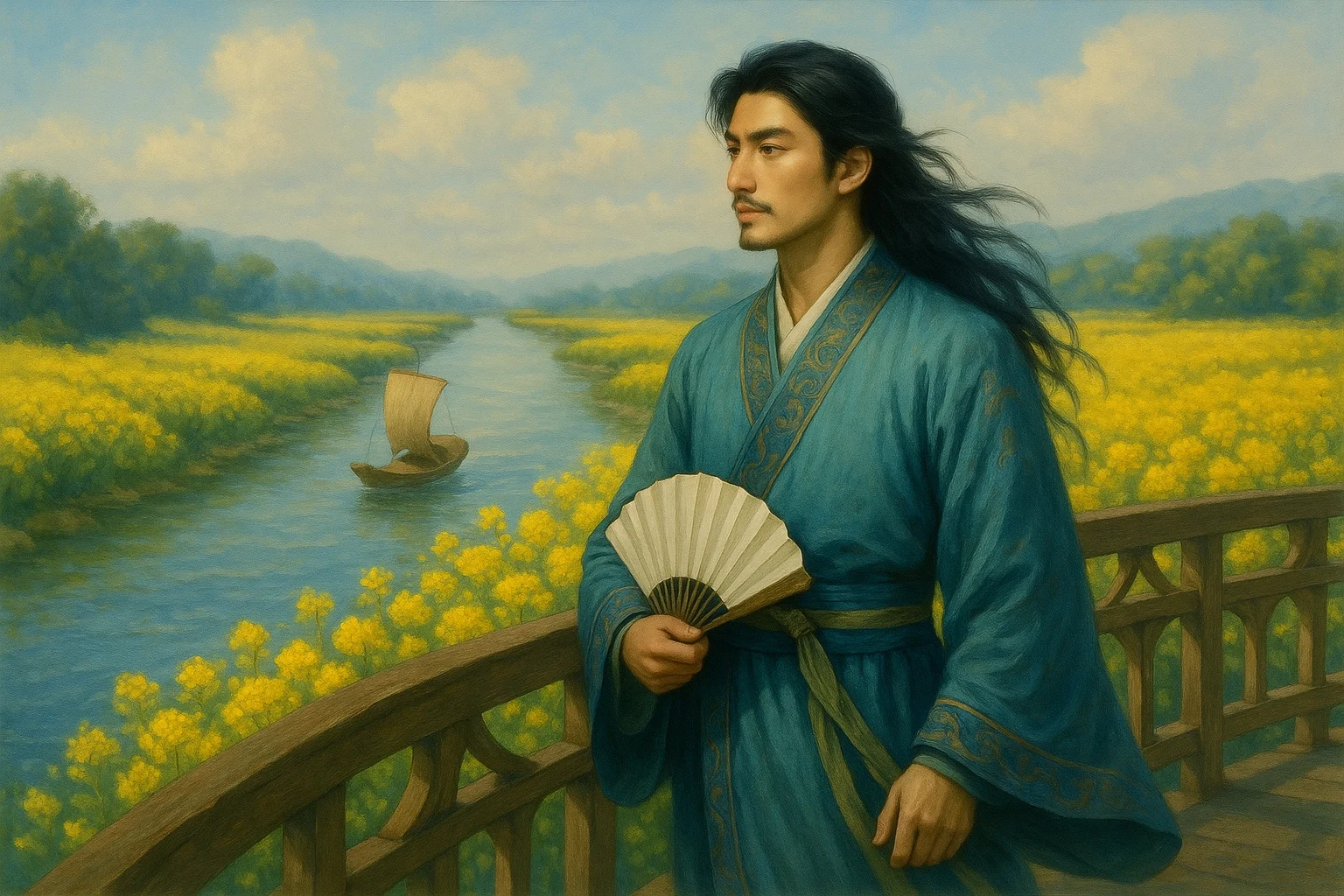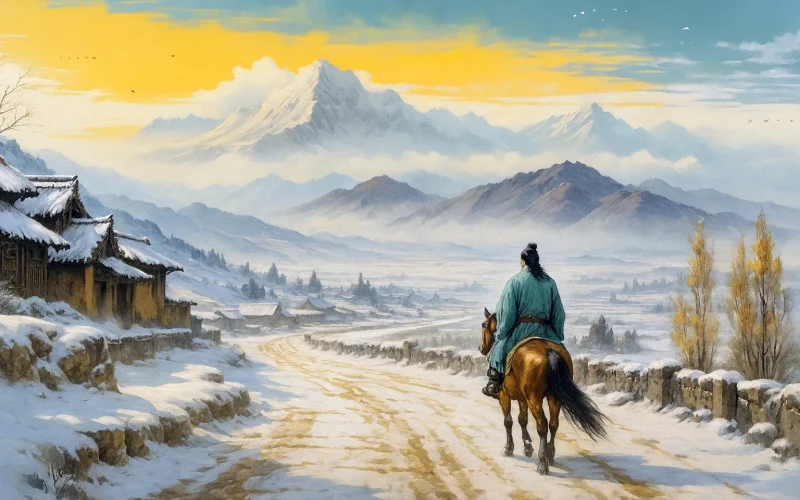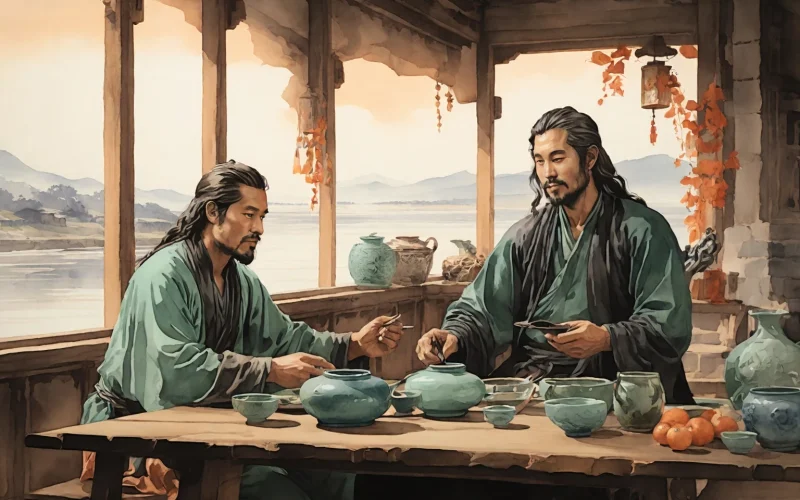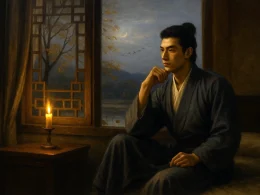Through bitter years my books I’ve kept,
Awaiting summons—poverty unwept.
At dusk, through snow my horse still strains,
At supper, yet another host sustains.
When sorrow comes, I read auspicious signs,
As age descends, I prize dawn’s golden lines.
Gazing afar toward Pingjin’s grand gate,
I know at home, spring warms my garden’s state.
Original Poem
「客舍有怀因呈诸在事」
崔峒
读书常苦节,待诏岂辞贫。
暮雪犹驱马,晡餐又寄人。
愁来占吉梦,老去惜良辰。
延首平津阁,家山日已春。
Interpretation
Composed during Cui Dong's itinerant years as a low-ranking aide, this poem stems from his experience lodging in humble quarters—his life marked by hardship, his ideals stifled. Through unflinching portraits of personal struggle, he voices the scholar's unwavering spirit, longing for friends, and nostalgia for home's vernal hues. Each line radiates intellectual integrity and quiet tenderness, blending resilience with wistfulness to reveal the complex inner world of late-Tang literati.
First Couplet: "读书常苦节,待诏岂辞贫。"
Dú shū cháng kǔ jié, dài zhào qǐ cí pín.
Through study, I’ve tempered resolve like steel;
Awaiting summons, why fear poverty’s ordeal?
The opening declares his creed. Tempered resolve (苦节) reframes scholarship as moral discipline, while awaiting summons (待诏) underscores faith in eventual recognition—despite present privation. The rhetorical why fear (岂辞) rings with defiance, establishing an unbroken spirit against the coming depictions of adversity.
Second Couplet: "暮雪犹驱马,晡餐又寄人。"
Mù xuě yóu qū mǎ, bū cān yòu jì rén.
Through twilight snow, I still whip my horse on;
My supper—another’s charity at dusk.
Reality intrudes harshly. Twilight snow (暮雪) merges temporal and environmental bleakness; whip my horse (驱马) conveys desperate urgency. The delayed supper (晡餐), reliant on others’ charity (寄人), exposes his humiliating dependency. These visceral details—the chafing reins, the borrowed meal—crystallize the aide’s precarious existence.
Third Couplet: "愁来占吉梦,老去惜良辰。"
Chóu lái zhān jí mèng, lǎo qù xī liáng chén.
Grief sends me to divine auspicious dreams;
Aging, I clutch each radiant hour tight.
Here, the psyche takes center stage. Divine dreams (占吉梦) betray his search for solace beyond waking hardships, while clutch each hour (惜良辰) admits time’s cruel slippage. The parallel grief (愁) and aging (老) frame a life besieged—yet the very act of clutching reveals undimmed vitality.
Fourth Couplet: "延首平津阁,家山日已春。"
Yán shǒu Píngjīn gé, jiā shān rì yǐ chūn.
Gazing toward Pingjin’s distant towers,
I know my home hills bask in spring’s glow.
The finale lifts toward light. Gazing (延首) stretches both neck and hope toward Pingjin, symbolic of bureaucratic promise. Yet the true anchor is home hills (家山), imagined sunlit and thawed—a stark contrast to his snowy present. This closing vision transmutes loneliness into quiet transcendence.
Holistic Appreciation
The poem progresses from depicting present hardships to affirming steadfast ideals, from the reality of adversity to the heart's attachment to homeland. Its emotions unfold in layers, expressed through language that is austere yet retains a gentle warmth. With his characteristic restrained tone, Cui Dong weaves together the sorrows of travel, commitment to ideals, hope for friendship, and longing for home into the minutiae of daily life. The verses avoid embellishment yet brim with depth. Rather than lamenting fate, the poet maintains moral integrity amid poverty and looks to the future despite the storms, revealing a scholar's noble character and philosophical contemplation of life.
Artistic Merits
The poem's language is unadorned and its emotions sincere, excelling in distilling poetry from everyday life. Its hallmark lies in revealing feeling through realism and achieving profundity through simplicity. By portraying life's trivialities and the toils of travel, it shapes the image of a scholar—poor yet purposeful, principled yet kind. The couplets are balanced, the scenes transition naturally, resonating with the spirit of scholars of the era while containing philosophical reflections. Readers can sense a profound humanistic strength within its tranquil context.
Insights
This poem teaches us that in life's low points, one should not abandon ideals or moral steadfastness. Even amid storms, we can still gaze upon spring mountains and pursue light. Through plain language and personal experience, Cui Dong helps us understand that a scholar's resolve is not only evident in moments of glory but also in the endurance and perseverance shown through poverty and hardship. No matter the circumstances, as long as one's inner direction remains true, the promise of spring will always endure.
About the Poet

Cui Dong (崔峒, dates of birth and death unknown), a Tang Dynasty poet from Anping, Hebei, was active during the Dali era (766 - 779). Along with Sikong Shu, Lu Lun and others, he was known as one of the "Ten Talents of Dali." His poetry primarily consists of five-character regulated verse (wulü), characterized by an elegant and subtle style. The Complete Tang Poems preserves 48 of his works. His poetic style resembles Liu Changqing's but appears more solitary and austere, reflecting the transition from the vigorous grandeur of High Tang poetry to the introspective quality of Dali-era verse.











